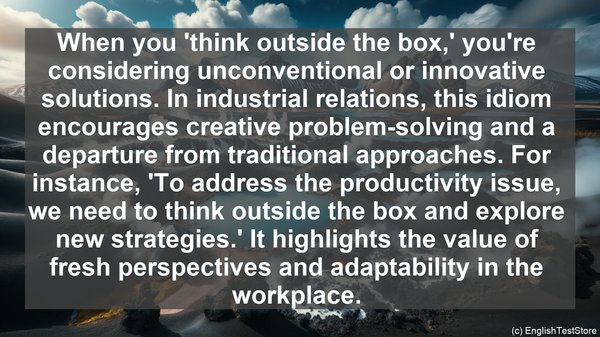Introduction: The Importance of Idioms in Industrial Relations
Welcome to today’s lesson. As an industrial relations analyst, your ability to understand and use idioms is crucial. Idioms not only add color to your language but also help you better comprehend the nuances of workplace conversations. In this lesson, we’ll explore 10 idioms that are frequently used in the context of industrial relations. So, let’s get started!
1. ‘Get the Ball Rolling’
This idiom means to initiate or start a process. In the context of industrial relations, it could refer to kick-starting a negotiation, launching a new project, or even beginning a meeting. For example, ‘Let’s get the ball rolling on the new employee benefits program.’ It signifies the importance of taking the first step and setting things in motion.
2. ‘On the Same Page’
When everyone is ‘on the same page,’ it means that they have a shared understanding or agreement on a particular matter. In industrial relations, this idiom is often used to emphasize the need for alignment and consensus. For instance, ‘Before we present the proposal to the management, let’s ensure we’re all on the same page.’ It highlights the significance of unity and coordination within a team.
3. ‘In the Loop’
Being ‘in the loop’ means being informed or included in a particular situation or decision-making process. In the realm of industrial relations, this idiom stresses the importance of transparency and open communication. For example, ‘Keep the HR department in the loop regarding any changes in the employee policies.’ It underlines the need for sharing relevant information to maintain a cohesive work environment.
4. ‘Put One’s Cards on the Table’
This idiom means to be open and honest about one’s intentions or opinions. In the context of industrial relations, it often implies a willingness to engage in sincere dialogue. For instance, ‘During the negotiation, it’s essential for both parties to put their cards on the table.’ It signifies the importance of transparency and trust-building in any discussion or negotiation.
5. ‘Read Between the Lines’
When you ‘read between the lines,’ you’re looking for the hidden or implied meaning in a message. In industrial relations, this idiom is particularly relevant during written communication or policy analysis. For example, ‘Although the memo seems straightforward, let’s read between the lines to understand the underlying implications.’ It highlights the need for critical thinking and inference in the workplace.
6. ‘Play Hardball’
To ‘play hardball’ means to adopt a tough or uncompromising stance, especially in negotiations or conflicts. In the realm of industrial relations, this idiom is often used to describe a situation where one party is being particularly aggressive or unyielding. For instance, ‘The management has decided to play hardball in the wage negotiation.’ It signifies the need to be prepared for challenging situations and to strategize accordingly.
7. ‘Smooth the Waters’
This idiom means to resolve or calm a tense or difficult situation. In industrial relations, it could refer to actions taken to mitigate conflicts or address employee grievances. For example, ‘The HR team’s primary goal is to smooth the waters between the employees and the management.’ It emphasizes the importance of conflict resolution and maintaining a harmonious work environment.
8. ‘Think Outside the Box’
When you ‘think outside the box,’ you’re considering unconventional or innovative solutions. In industrial relations, this idiom encourages creative problem-solving and a departure from traditional approaches. For instance, ‘To address the productivity issue, we need to think outside the box and explore new strategies.’ It highlights the value of fresh perspectives and adaptability in the workplace.

9. ‘Dot the I’s and Cross the T’s’
This idiom means to be meticulous and thorough, especially when it comes to details or paperwork. In the context of industrial relations, it underscores the importance of accuracy and compliance. For example, ‘Before submitting the report, make sure to dot the i’s and cross the t’s.’ It signifies the need for precision and attention to detail in any professional documentation.

10. ‘Keep One’s Ear to the Ground’
To ‘keep one’s ear to the ground’ means to stay informed about the latest developments or trends. In industrial relations, this idiom highlights the importance of being aware of industry changes or employee sentiments. For instance, ‘As an HR manager, it’s crucial to keep your ear to the ground to address any emerging concerns.’ It emphasizes the need for proactive information gathering and staying connected with the workforce.
Conclusion: Mastering Idioms for Enhanced Communication
And that brings us to the end of our list. These 10 idioms are just the tip of the iceberg when it comes to the rich world of English language expressions. By familiarizing yourself with idioms, you not only enhance your language skills but also gain insights into the cultural and contextual aspects of communication. So, keep exploring, keep learning, and soon, you’ll be an idiomatic pro! Thank you for watching, and see you in the next lesson!
